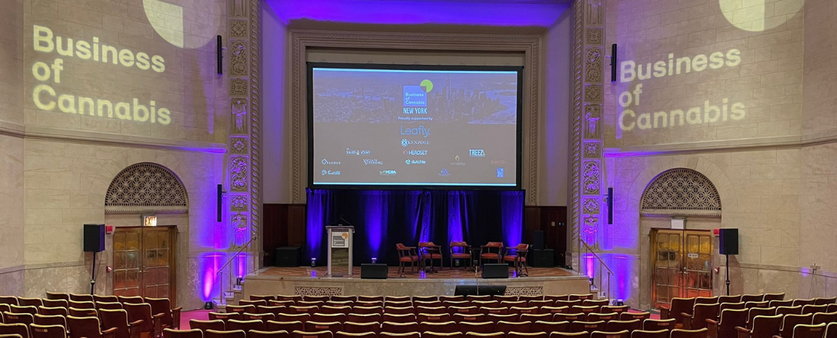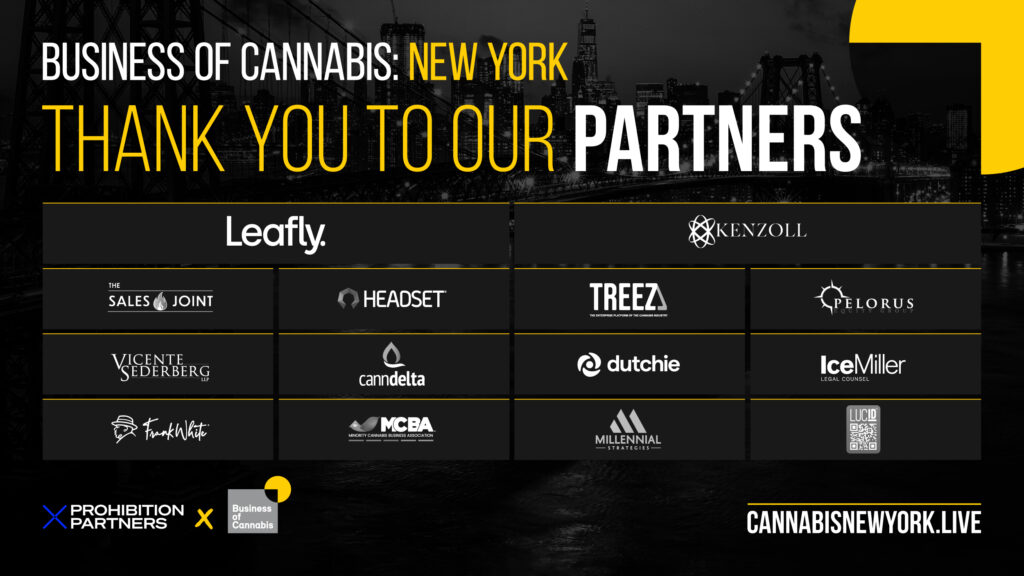
After “a year that has almost definitely cemented New York as the capital of cannabis”, Business of Cannabis returned to the state for its second year. Bringing 400 delegates and speakers to explore what’s changed in the last year and the new opportunities that have arisen.
Prohibition Partners CEO Stephen Murphy, welcomed guests to The New York Academy of Medicine to discuss the ‘future of New York cannabis policy, and therefore global cannabis policy’.
Touching on what would be the recurring themes of the day, Leafly’s CEO Yoko Miyashita, discussed the regulations promised and delivered in the previous year, the business opportunities and the need for “New York to be the first state to get social equity right”.
Regulatory updates
With a number of influential politicians speaking, delegates at Business of Cannabis: New York got key updates on the progression of New York’s cannabis regulations.
Tremaine Wright and Crystal Peoples-Stokes sat down to discuss the implementation of Governor Hochuls $200m fund. Chair of the New York Cannabis Control Board Tremaine Wright confirmed that ‘we are on target’ to open the first stores in 2022.
“We are not opening ‘a store’, but there will be stores open by the end of the year. We will keep opening until 150 are open across the state.”
Axel Bernabe, Chief of Staff & Senior Policy Director at the Office for Cannabis Management (OCM), provided an update on the progress of regulations across New York State. He said that within the next few months, the OCM will have established an ‘equity driven’ supply chain, ‘supported by local farmers’, adding that great opportunities will be layered on top of this at a later date.
Mr Bernabe also gave a timeline to the announcement of the first CAURD holders. Though nothing is officially announced, Mr Bernabe said that it could be, at the upcoming Cannabis Control Board meeting, expected on November 21.
“In 15 months, we’ll have a fully established supply chain, built on social equity. That supply chain will form the backbone of what we’re going to build on in the future.”
A consumer market
Panelists throughout the day explored the opportunities of a new consumer focused market. With the legal market, the opportunity for branding and consumer focused companies grows. Although New York has proposed some strict advertising guidelines, Matthew Mazzucca, former creative director at Barneys New York, sees an opportunity to make a more customer centric experience when buying cannabis, saying “the education piece is really strong here and getting the customer engaged means understanding what the product is”.
Lucas McCann also addressed the issues of restrictive market, calling the future of cannabis marketing in the state ‘numbers game’ with people choosing ‘high THC products’ over branding. ‘That’s what’s going to drive retail.’
Other speakers were more optimistic about cannabis branding even with the advertising restrictions. The legal market provides consumer research in a way that wasn’t available in the legacy market. Vlad Bautista, CEO at Happy Munkey, who has brought his business from the legacy market, shared insights from his own consumers:
“This industry is overwhelmingly millennial and Gen Z, and we know our customers are overwhelmingly Gen Z, based on the statistics, and they care deeply about supporting companies that are authentically committed to these issues”
Fab 5 Freddy echoed this sentiment in a later panel saying “Cannabis is in its infancy – it needs brands. Something that can create an emotional connection with the consumer…Just coming in with a big marketing budget isn’t going to cut it, you need a genuine connection and love for the plant.”
Social equity
Social equity ran through every panel today from the importance of social equity in the supply chain, in regulations and for investment opportunities.
The day rounded off with a series of talks focusing on the topic. CJ Wallace delivered his keynote speech, sharing his vision for social equity in cannabis and the importance of Black ownership in the space.
“Cannabis culture is black culture and black culture is cannabis culture.”
During the ‘Building an Ethical Industry’ panel speakers explored New York’s ambitious social equity plans. Vicente Sederberg’s Marc Ross set the tone, stating: “There is an ethical responsibility we have in this space to bring along people from the legacy market and redistribute wealth.” Although there were some concerns raised about how successful the $200m fund would be at supporting new businesses and social equity applicants, Vlad Bautista, reminded delegates that “by its nature venture capitalism is predatory… you have to understand that sometimes your value cannot be determined by a spreadsheet.”
Panelists agreed that the most important step towards a social equitable and responsible market was federal legalization. Not only for people but for the ‘environmental impact,’ said Marc Ross
Subversive Capital’s Michael Auerbach said that he believed ‘social equity has been an abject failure, in all industries.’ including cannabis. “The only true social equity program is the end of prohibition at the federal level.”
Business of Cannabis is proud to have hosted our second New York conference in as many years, bringing over 400 industry leaders to discuss the future of cannabis in North America.
We would like to extend a huge thanks to all of our partners, speakers and delegates who showcased the very best of the industry we’re proud to be a part of.
























